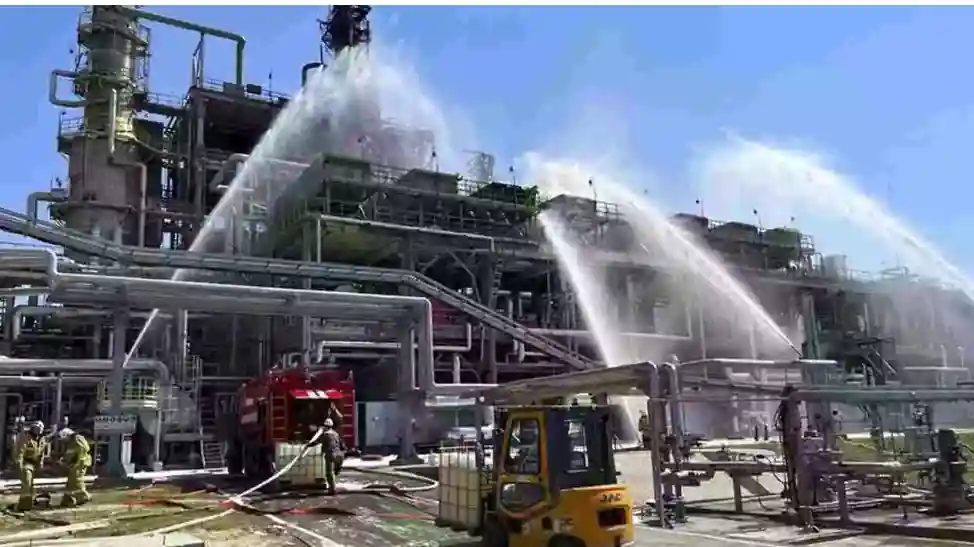Ukraine’s latest military campaign has dealt a significant blow to Russian oil exports, striking directly at the backbone of Moscow’s war economy. The coordinated precision strikes, which also disrupted critical fuel supplies, mark a turning point in the conflict as Ukraine escalates from defensive maneuvers to offensive economic warfare. The attacks are designed not only to limit Russia’s military capacity but also to ripple across international markets, further tightening the pressure on the Kremlin.
According to Ukraine’s southern command, every refinery, depot, and terminal targeted was chosen for its direct role in sustaining the Russian war effort. Brigadier General Andriy Kovalenko declared, “Russia’s war machine depends on oil revenue and uninterrupted fuel supplies. By severing those links, we weaken its ability to bomb our cities.” The strikes on Russian oil exports were presented as lawful military operations intended to dismantle Moscow’s logistical and financial lifelines.
Confirmed Damage and Global Reactions
Satellite imagery reviewed by Western intelligence confirmed extensive destruction along Russia’s Black Sea oil terminals, with thick columns of smoke visible for hours. U.S. officials described the scale of disruption to Russian oil exports as far greater than Moscow’s public statements admit. Meanwhile, the Kremlin denounced the attacks as “terrorist acts against civilian infrastructure,” although state-owned energy giant Rosneft quietly acknowledged “temporary suspension of shipments” from key terminals.
President Vladimir Putin vowed retaliation, framing the strikes as an attempt to deny ordinary Russians access to heat and fuel. Yet the most immediate impact was felt in the markets: Brent crude surged nearly 4% in early trading, and energy importers in Asia scrambled to secure alternative supplies. Analysts at the London Energy Exchange called the assault “a sustained campaign” rather than a symbolic action.
Economic Pressure Through Energy Warfare
The Ukrainian government insists that targeting fuel supplies is a legitimate response to Russia’s relentless bombing of Ukraine’s power grid. Foreign Minister Dmytro Kuleba argued, “Every missile fired at our energy grid was powered by Russian oil. Striking back at Russian oil exports is fully consistent with the right of self-defense.”
Economic experts warned that disruptions of this scale could have global consequences. Dr. Leila Thompson of the Oxford Energy Institute noted, “If these strikes continue, the knock-on effect on inflation could be substantial. The world economy remains deeply tied to Russian hydrocarbons, despite sanctions.” Traders also reported that shipping insurance premiums for Russian tankers rose sharply, signaling growing uncertainty in global trade.
Russia’s Domestic Strains
Inside Russia, signs of strain are beginning to surface. Independent media outlets reported fuel shortages in several regions, with long queues forming at gas stations. A truck driver in Krasnodar complained of waiting hours for diesel, warning that prolonged shortages could devastate transport companies. While Russian officials insist these are temporary disruptions, the reliance on Russian oil exports for both domestic stability and international revenue makes recovery far from guaranteed.
The Kremlin maintains that it has “alternative routes” for energy shipments, but analysts caution that rebuilding damaged infrastructure and restoring full capacity could take months. Meanwhile, Ukrainian commanders have openly hinted at further strikes if Russian bombardments of Ukrainian cities continue.

International Reactions
The global response has been mixed. The United States and European Union refrained from explicitly endorsing the strikes but reaffirmed their solidarity with Kyiv. A senior EU diplomat stated privately, “Ukraine has the sovereign right to deny Russia the resources it uses to fuel aggression.”
China, however, urged restraint, warning that instability in Russian oil exports could disrupt global energy security. India, a key buyer of discounted Russian crude, voiced similar concerns, noting that delayed shipments would raise costs for developing economies.
Humanitarian groups, including the International Red Cross, cautioned against escalating attacks on energy infrastructure, citing risks to civilian access to heating and transport. Kyiv countered that Russia had long weaponized energy against Ukrainian civilians, pointing to Moscow’s repeated attempts to freeze Ukrainian populations during past winters.
A New Phase of the Conflict
Security experts suggest Ukraine’s campaign against Russian oil exports signals a new phase of warfare, one where economic disruption is as critical as battlefield gains. Retired U.S. General Ben Hodges described the strikes as a “turning point,” undermining Russia’s logistics and troop rotations. Conversely, analysts like Tatiana Orlova warned of potential escalation, as the Kremlin might intensify missile barrages against Ukraine’s own energy grid in retaliation.
Despite these risks, Ukrainian officials appear committed to expanding their economic warfare strategy. General Kovalenko summed it up succinctly: “As long as missiles fall on Odesa and Kharkiv, we will deny the Russian army its lifeblood.”
Conclusion
The recent strikes targeting Russian oil exports and fuel supplies represent one of Ukraine’s boldest moves in the conflict to date. While they have already destabilized global energy markets and exacerbated pressure on Moscow, the long-term outcome remains uncertain. Will the disruption tilt momentum toward Kyiv by crippling Russia’s war economy, or will it trigger even harsher reprisals from Moscow?
What is clear is that the war has entered an economic dimension where tankers, refineries, and fuel supplies are as contested as trenches and artillery. Ukraine’s ability to choke off Russian oil exports may prove decisive in reshaping the balance of power in this prolonged conflict.
More news at Swiftreportnow



